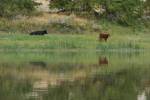Critics say new wild horse panel is pro-livestock
RENO -- A panel of experts chosen to spend two years generating the definitive study on wild horse management in the West is kicking up controversy before it even gets out of the chute.
Wild horse protection advocates contend the committee charged with solving a conundrum that has eluded consensus for decades is stacked with allies of the livestock industry who won't give the horses a fair shake.
The panel's 14 members were picked by the National Academy of Sciences, an independent organization chartered by Congress to advise the government on science. Their first meeting is scheduled for Thursday in Reno.
The American Wild Horse Protection Campaign, Cloud Foundation and others say several of the appointees are outspoken defenders of the U.S. Bureau of Land Management's current management strategy that relies on "mass wild horse roundups and removals at the expense of on-the-range management strategies.'"
"The heart of the controversy surrounding the wild horse issue is the conflict between private livestock and wild horses on the 11 percent of BLM land that is designated as wild horse habitat," said Suzanne Roy, director of the American Wild Horse Protection Campaign, a coalition of environmental, public interest and animal rights organizations.
The public's need for an accurate, objective review of the government's controversial wild horse management program will not be served unless the National Academy of Sciences corrects the panel's "imbalances," Roy said.
Academy spokesman Bill Kearney said the organization's staff and legal counsel will investigate any concerns about conflicts and consider disqualifying members or adding new ones to provide additional expertise.
The BLM , which plans to round up another 6,000 horses in the coming months, argues the gathers are necessary to ease ecological damage on the range. Opponents maintain the horse numbers are much lower than historical highs and that the roundups are intended to appease ranchers who don't want the horses competing with their cattle and sheep for limited forage on arid rangeland.
The committee is tasked with producing a comprehensive study that addresses, among other things, total herd populations, genetic diversity, appropriate management levels, and population control options including immunocontraception and "managing a portion of a population as nonreproducing," according to the academy's website.
Committee members under fire include Dr. David Thain, former Nevada state veterinarian who is an assistant professor in the Department of Agriculture, Nutrition and Veterinary Sciences at the University of Nevada, Reno.
Thain is a member of the Nevada Livestock Association -- a "clear conflict of interest," said Ginger Kathrens, executive director of the Colorado-based Cloud Foundation.
Thain also has published research on two drugs used to control horse fertility that some horse advocates dislike for fear of side effects, Roy said. He has a "vested academic interest in promoting specific fertility control agents" and thus is not an objective panel member, she said.
Thain said he was familiar with the criticisms but felt it was best not to respond.
Other panel members targeted by critics include Erik Beever, a research landscape ecologist with the U.S. Geological Survey's Northern Rocky Mountain Science Center in Bozeman, Mont., and Paul Krausman, a wildlife biologist in the University of Montana's College of Forestry and Conservation in Missoula.
Beever is a member and Krausman the president-elect of the Wildlife Society, a national professional scientific group that Roy said has taken an advocacy role in defending BLM roundups.
Nevada has roughly half of the 33,000 wild horses that freely roam 10 Western states.
Horse advocates to rally
CARSON CITY -- Horse advocates will rally Tuesday in Carson City against a state agency's plans to remove 50 to 100 abandoned horses from the range in Northern Nevada after a rash of vehicle accidents.
Nevada Department of Agriculture officials said they began removing horses on Friday after more than 30 recent collisions involving horses and vehicles on three rural highways in Lyon and Storey counties roughly around Silver Springs and Virginia City.
They blamed the problem on stray horses coming down from the Virginia Range in search of forage and water. But critics called for the department to reinstate cooperative agreements with nonprofit horse groups to control the animals' movements and to prevent horses from going to the slaughterhouse.
Tuesday's rally will begin at 11 a.m. outside the Legislative Building.
THE ASSOCIATED PRESS























